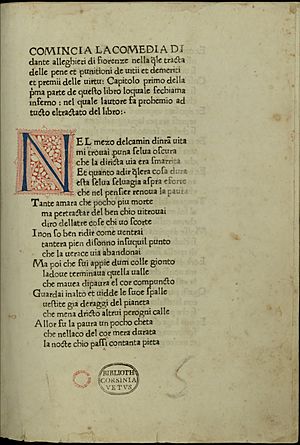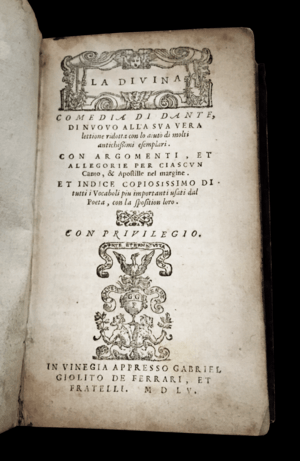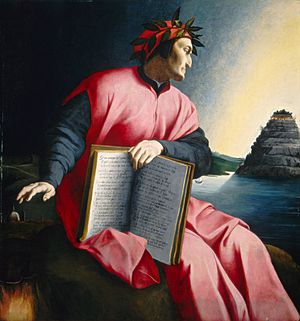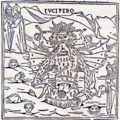Divine Comedy facts for kids
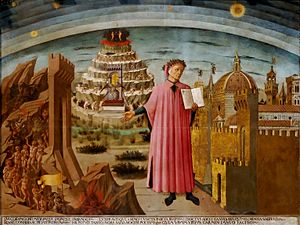
The Divine Comedy is a very long and important poem written by Dante Alighieri. It tells the story of a journey through the afterlife, which is what some people believe happens after death. The poem has three main parts: Inferno (which means Hell), Purgatorio (a place called Purgatory), and Paradiso (meaning Paradise or Heaven). This amazing work is known all over the world.
Inferno is the most famous part of the poem. It describes a man's travels through the Christian ideas of hell, purgatory, and heaven. The word "comedy" here doesn't mean funny. Instead, it means the story has a happy or positive ending, which was a common meaning for "comedy" long ago.
The poem was first simply called Comedìa in the Tuscan dialect of Italian. This was the title when it was first printed in 1472. Later, the word Divina (meaning "Divine" or "Godly") was added by a writer named Giovanni Boccaccio. The first time the poem was officially called Divina Comedia on its title page was in 1555.
Contents
Journey Through Hell: Inferno
The story begins with the narrator, Dante Alighieri, feeling lost and confused in a dark forest. He sees a huge mountain that stands for sin and is bothered by a lion, a leopard, and a she-wolf. Luckily, he meets the ancient Roman poet Virgil. Virgil tells Dante that he must guide him through the nine circles of hell. This journey is necessary for Dante to find his way back to a good path.
First Circle: Limbo
This first circle is for souls who did not accept Christ. This includes people who didn't believe in God (atheists), people from older religions (pagans), and those who were never baptized. They didn't do bad things on purpose, but they couldn't enter Heaven because they lacked faith. Hell also didn't let them go very deep.
Their punishment isn't physical pain. Instead, they feel sad because they have no hope of ever seeing Christ. It's a mental punishment. After this circle, a creature named Minos decides where each soul goes. He wraps his tail around himself a certain number of times to show which circle they must go down to.
Second Circle: Lust
In this circle are souls who gave in to strong, uncontrolled desires. They are the first ones in Hell to truly suffer physical punishment. These souls are endlessly tossed around in a huge, never-ending storm. This storm shows how their desires made them drift aimlessly in life.
Third Circle: Gluttony
This circle is watched over by a three-headed dog monster named Cerberus. Here, people who ate too much and were greedy with food are punished. They lie in cold, dirty mud. In life, their food gave them warmth and comfort. But in Hell, they are punished with cold, heavy rain. Cerberus scratches, tears, and bites at these spirits.
Fourth Circle: Greed
In life, some people were very stingy and hoarded their money. Others spent money foolishly without thinking. Both groups are here, pushing and pulling huge bags of gold. They do this just as they focused on money in their lives. The greedy are guarded by Plutus, who was known as a god of riches.
Fifth Circle: Wrath
In a muddy river called the Styx, angry souls fight each other on the surface. This river goes around the city of Dis, where people who actively sinned are kept. When Virgil tries to enter, the angels of Hell shut the gate in his face. He and Dante then go to a special gate. This is the gate where Christ entered Hell during his three-day trip to free a few chosen people. When Christ did this, he broke the gate so it could never close again.
Sixth Circle: Heresy
People who believed things against the main teachings of the church (heretics) are trapped here. They are stuck inside tombs made of red-hot iron.
Seventh Circle: Violence
This circle holds those who were violent during their lives. People who hurt others or damaged property are in a river of fire. How deep they are in the river depends on how much harm they caused. For example, Alexander the Great is in the river up to his eyebrows. People who hurt themselves are turned into plants. Birds peck at them and tear them apart. Those who were violent against God or nature are also here. They have to walk forever on burning sand.
Eighth Circle: Fraud
This circle is for many different kinds of tricksters. This includes flatterers, people who bought or sold church positions, sorcerers, fortune-tellers, false prophets, corrupt politicians, hypocrites, thieves, people who caused divisions, alchemists, and counterfeiters. Each punishment is the opposite of what they did in life. For example, fortune-tellers, who tried to see the future, are forced to walk backward forever.
Ninth Circle: Treachery
This is the deepest circle, for those who betrayed others. People who betrayed their family are stuck in ice up to their faces. Those who betrayed their country or government are also here. People who betrayed their guests lie in the ice, completely covered except for their faces. The worst traitors, those who betrayed their leaders or helpers, are completely buried in ice in different positions.
In the very center of Hell, because he committed the worst sin (betraying God), is Satan. Satan is described as a huge monster with three faces and six wings. He cries forever from his six eyes. Each of Satan's mouths chews on a famous traitor from history. Brutus and Cassius are being chewed feet-first. The middle mouth is chewing on Judas Iscariot, who betrayed Jesus. Satan chews on Judas's head, and his back is being torn by Satan's claws.
Dante and Virgil escape Hell by climbing down Satan's fur. They go through the center of the Earth and come out on the other side of the world. From there, they will begin their climb up Mount Purgatory.
Images for kids
-
Gustave Doré's drawings illustrate The Divine Comedy; here Charon takes souls across the river Acheron to Hell.
-
Paradiso, Canto III: Dante and Beatrice talk to Piccarda and Constance of Sicily, in a painting by Philipp Veit.
-
An illustration of Lucifer from an early printed edition of Inferno, canto 34, from 1491.
See also
 In Spanish: Divina comedia para niños
In Spanish: Divina comedia para niños
 | Aurelia Browder |
 | Nannie Helen Burroughs |
 | Michelle Alexander |


